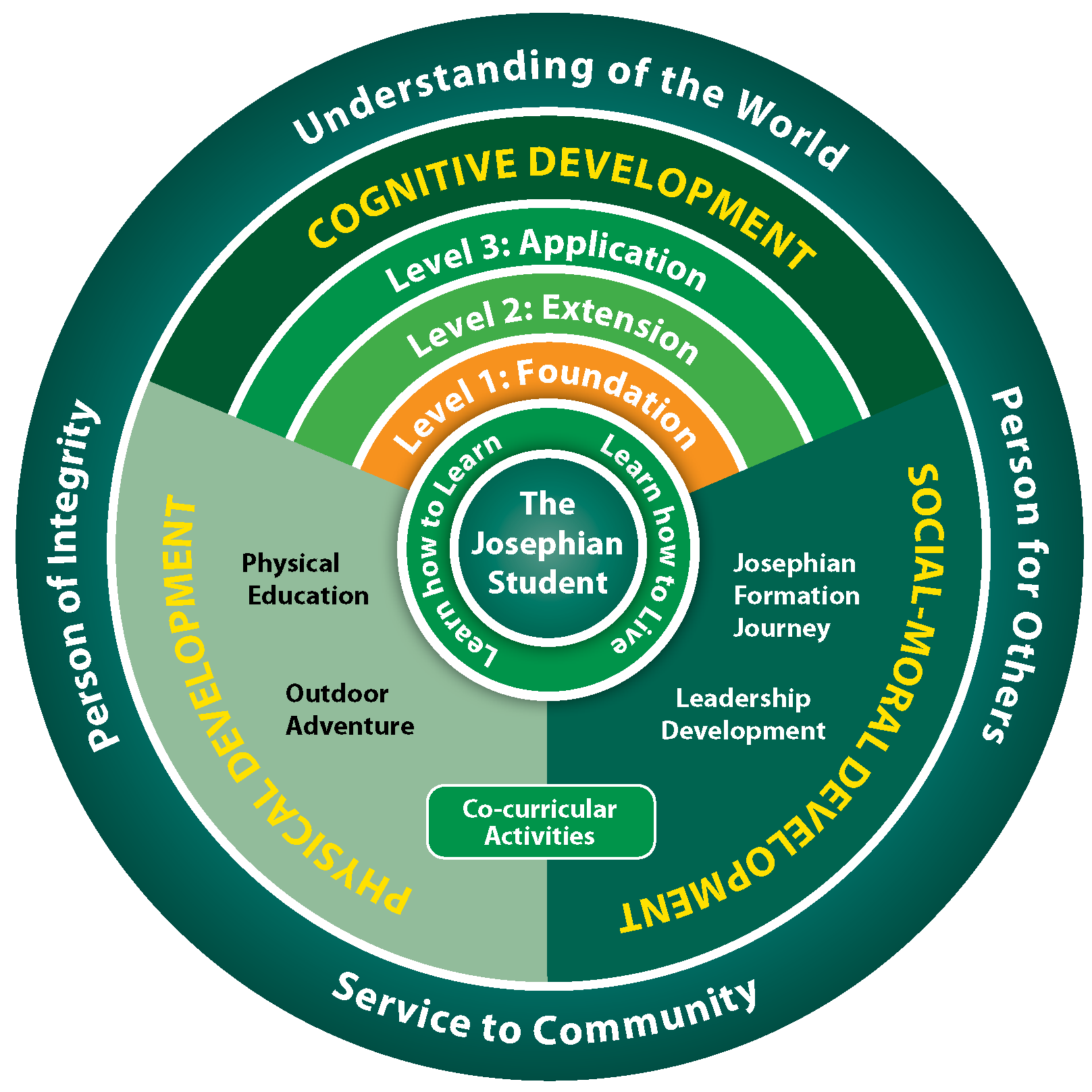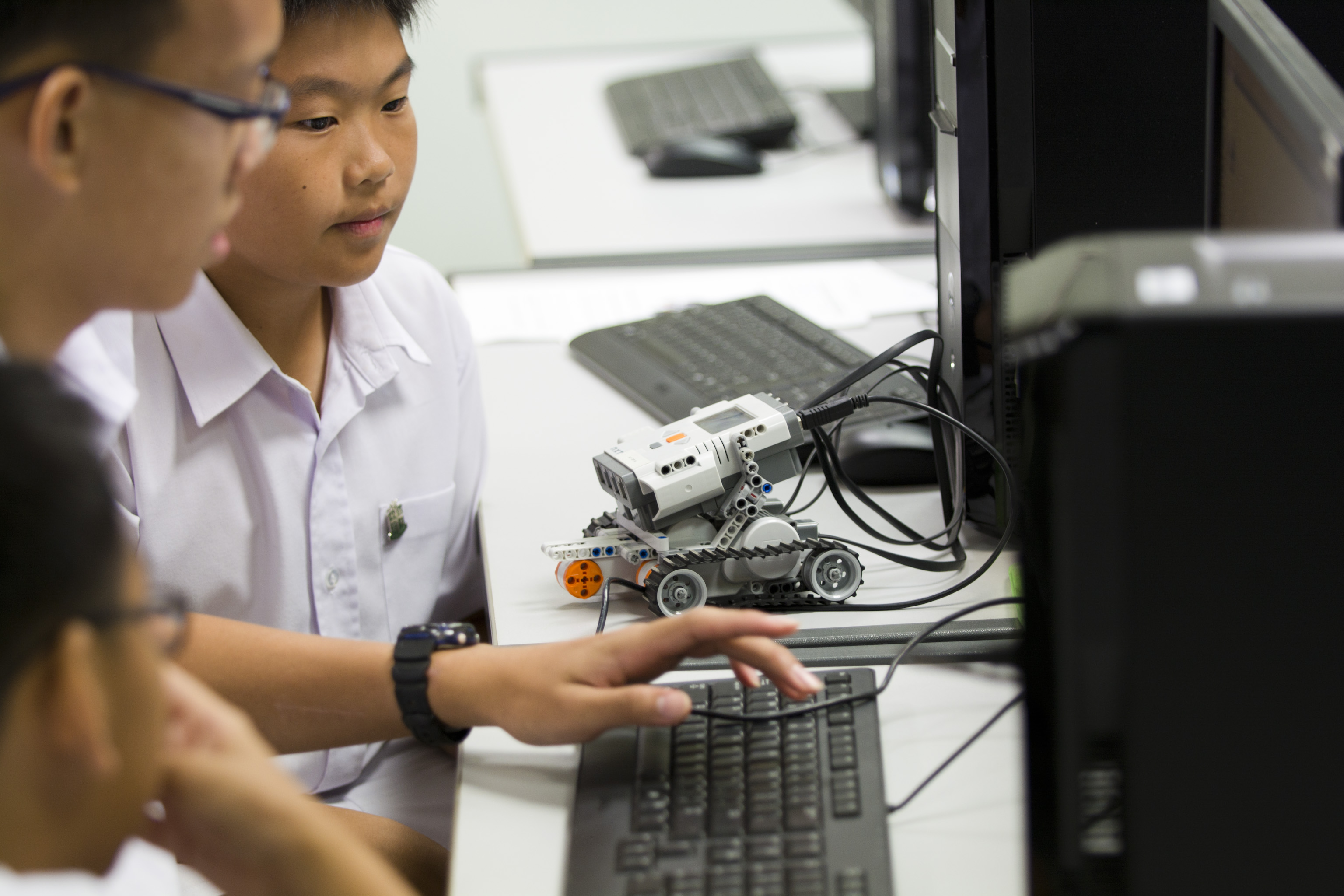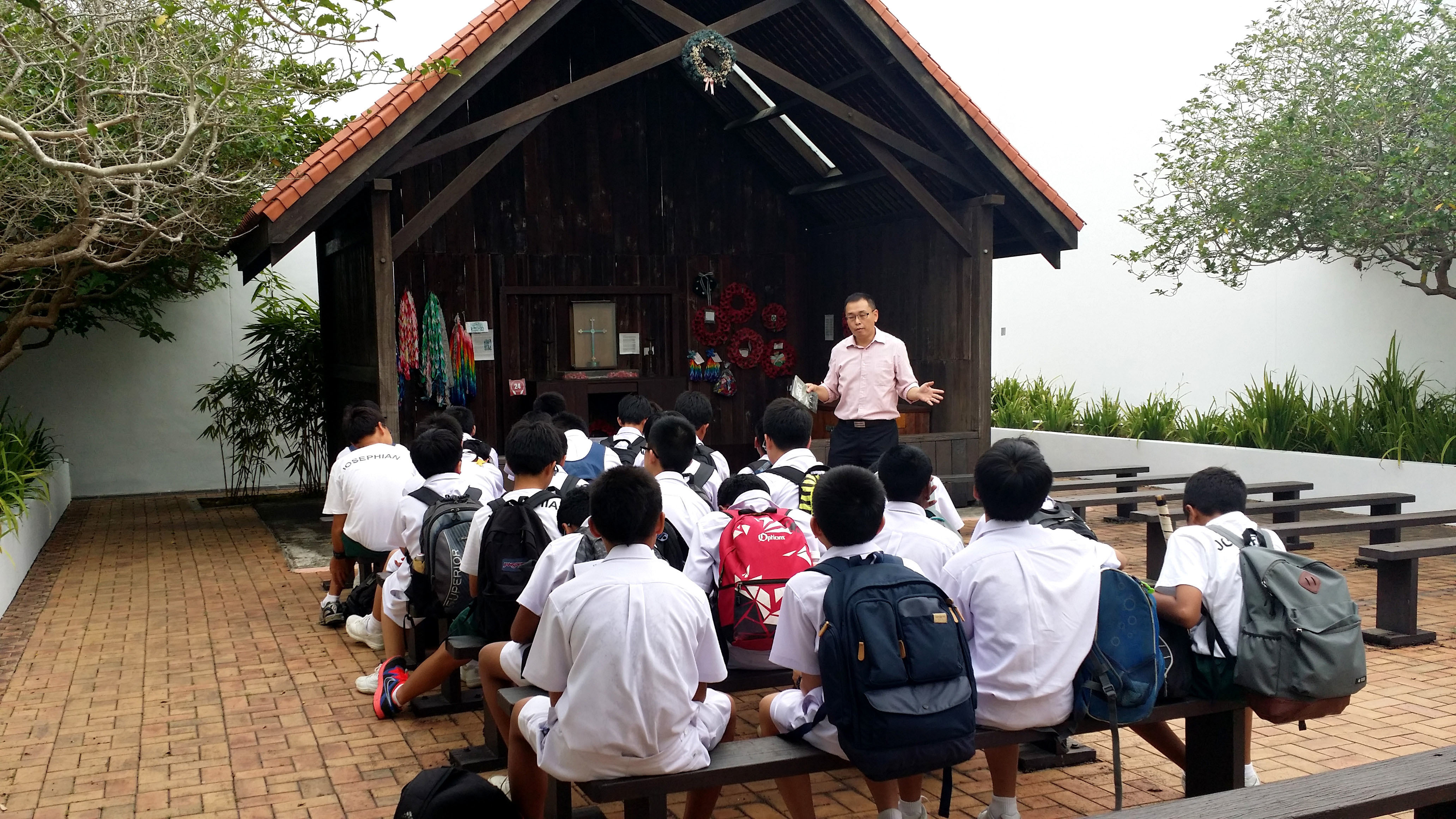Integrated Programme
The SJI Integrated Programme (IP) leading to the IB Diploma aims to empower young people to deal with the complexity, diversity and rapid changes living in today’s globalized world.
This is achieved through an inter-disciplinary approach that centres on 3 processes: Core, Apply and Integrate.

It describes a student as moving from core content, skills and disposition aligned to IBDP knowledge, to application in the real world, and eventually integrating their knowledge to create purposeful connections between learning and doing for effective leading and service. It also provides opportunities for in-depth study in an area of talent and discovery of new areas of interest.
SJI IP also emphasize developments in the cognitive and affective domains, focusing particularly on thinking and communication, as well as character and leadership development.
Desired Student Outcomes
SJI IP aims to nurture students to become persons who lead holistic, principled and meaningful lives that make a positive difference to the lives of others, through helping each student to discover and develop their unique vocation and talents. More specifically, SJI IP will nurture future leaders for Singapore who will be ‘Persons of Integrity’ and ‘Persons for Others’, with a global outlook but strongly rooted in the Singapore culture and community.
IP Learner Profile:
- Explorer: Always curious and show sustained interest in their learning
- Reflective: Ability to give thoughtful consideration to their own learning and those around him
- Independent: Independence in learning and not afraid to explore new areas of knowledge
- Multi–tasker: Ability to handle multiple deadlines and projects
- Principled: Takes responsibilities and act with integrity
For more information, click on the following links:
Levels of Learning at SJI (Year 1 - 4)

The Levels of Learning is the core framework behind the Cognitive Development component of an SJI education. It describes the Josephian student as moving from foundational subject-based knowledge, to extending learning by adopting an inquiry-mindset motivated by interest and passion, and eventually making use of this knowledge in service to the community in authentic settings.
While the Levels of Learning are designed with the IBDP in mind, all SJI students at the Lower Secondary years will have a chance to participate in all 3 Levels of Learning.
- Level 1 Learning: Academic Foundation
- Level 2 Learning: Academic Extension
- Level 3 Learning: Academic Application
Level 1 Learning: Academic Foundation
SJI offers a broad-based curriculum, comprising languages, humanities, sciences and mathematics, which provides a strong foundation for exploring interests and talents, and for further studies in the IBDP for the boys on the IP track. At upper secondary level, most students offer an 8 subject combination.
_2023-ipsec.png)
-
Josephian Arts Programme (Visual Arts)
The Josephian Arts Programme (JAP) – Visual Arts is a four-year academic course designed to nurture creativity and critical thinking in Josephians from Years 1 to 4. The programme equips students with the technical skills to create art, while encouraging them to make meaningful connections between research and artistic practice. Students learn to communicate ideas clearly, respond thoughtfully to artworks, and reflect on the role of art in society, building both personal expression and social awareness.
JAP Visual Arts is compulsory for students admitted via the Direct School Admission (DSA) in Visual Arts.
-
Josephian Arts Programme (Music)
The JAP Music programme is a dynamic academic programme designed for students with a passion and aptitude for music. We focus on developing skills that equip students to become informed, versatile musicians, offering diverse performing opportunities that foster growth and creativity. Throughout the programme, students are encouraged to explore, experiment, collaborate, and apply the concepts they learn, empowering them to embark on their own unique musical projects and express their artistic vision.
IP students will be able to experience the programme over four years.
Level 2 Learning: Academic Extension (Years 1 & 2 Programmes)
Building Understanding of the World Through Inquiry & Nurturing a Sense of Wonder and Curiosity
-
Academic Discovery Modules (ADM)
 To inquire about the world or the self through a process guided by teachers. This process will get students to adopt lenses of the discipline in order to answer essential questions. As an example, this will give them opportunities to think and act like a scientist or historian.
To inquire about the world or the self through a process guided by teachers. This process will get students to adopt lenses of the discipline in order to answer essential questions. As an example, this will give them opportunities to think and act like a scientist or historian.
-
Independent Study Modules (ISM)
 To inquire about a topic of great interest through an independent research. Students get to pose any inquiry questions (E.g. What kind of lives do celebrities lead? Why do frogs croak after rain?) which may arise in their daily lives, and go through an independent research process to answer these questions. They will then do an oral presentation in order to communicate their learning.
To inquire about a topic of great interest through an independent research. Students get to pose any inquiry questions (E.g. What kind of lives do celebrities lead? Why do frogs croak after rain?) which may arise in their daily lives, and go through an independent research process to answer these questions. They will then do an oral presentation in order to communicate their learning.
-
Josephian Innomakers Programme
The Josephian Innomakers Programme aims to provide students with the opportunities and platforms to learn through play, and through this playful learning, learn to be agents of change by innovating in service to the community. Creative Problem Solving framework and Design Thinking will be integrated into the curriculum to encourage students to Think, Make, Do and Share. Students will be introduced to the 21st-century workplace as they learn skills like coding, building robots, 3D printing, video-making and cardboard modelling. Skills and dispositions aligned with the IBDP Approaches to Learning (AtL) will be developed as the learning experiences challenge students to communicate, collaborate, self-manage, research, and think creatively as well as critically.
-
Junior Researcher Programme (JRP)
The Junior Researcher Programme focuses on educating and equipping students with foundational research skills, which will be extended as they progress on to Year 3 and 4 IP and SEC with Signum Fidei and Curriculum+ respectively. It is designed to encourage interdisciplinary learning and discovery by infusing research skills as a pedagogical tool in Level 1 and Level 2 learning. The programme also seeks to talent scout and develop IP and SEC students, with aptitude in research work, to represent the school and participate in competitions and various research programme at the national level.
Level 3 Learning: Academic Application (Years 3 & 4 Programmes)
Systematic Inquiry to Address Issues or Problems in Service to Community
-
ArtScience Programme (Year 3 IP)
The ArtScience Programme develops students who can think beyond subject boundaries and integrate their approach towards problem-solving. ArtScience fosters ways of thinking that encourage creative and systematic problem-solving. It offers a transdisciplinary methodology that combines aesthetic and analytical thinking. This methodology, supported by mentors and community partnerships, emphasises Aspirational Design – where students’ passions meet societal needs – and nurtures essential 21st Century Competencies (e.g. Inventive Thinking) in our students.
The ArtScience Programme uses a Conception-Translation-Realisation framework to generate ideas to solve problems based on an annual theme. Students work collaboratively to define a problem, discuss and negotiate ideas, undertake research, test their prototypes to solve the identified problem, and to ‘sell’ their problem-solving ‘story’. Through ArtScience, students visit relevant art/science sites, attend talks by industry practitioners, conduct experiments, and engage in knowledge-building and art/design activities.
-
Signum Fidei Programme (Year 4 IP)
The Signum Fidei Programme provides an opportunity for Year 4 IP students to collaborate with external organisations of their choice, whilst applying the Design Thinking framework in practical ways. This empowers our students to transform their learning into feasible solutions. To this end, our students learn how to collaborate, ideate and creatively solve problems in a VUCA (Volatile, Uncertain, Complex and Ambiguous) world.
These self-initiated partnerships with external organisations encourage our Josephians to adopt a forward-looking mindset in designing sustainable prototypes that can benefit society at large, bearing in mind the UN’s Sustainable Development Goals. Accordingly, the Signum Fidei Programme cultivates an enterprising and innovative spirit in our Josephians, and encourages them to be Men for Others.
Pedagogy
SJI IP adopts a process-oriented pedagogical approach so that students will ‘Learn How to Learn’, to become autonomous life-long learners. The pedagogical focus will be on the development of students’ ability to acquire the necessary learning skills and dispositions which would enable them to create new knowledge, rather than just to acquire knowledge and skills for the mere purpose of doing well in examinations.
In helping students learn how to become effective learners, the pedagogy will help students to realistically evaluate and regulate their own learning and performance. It will also nurture their affective and cognitive competencies such as to reflect, be self-confident, be self-aware, to be willing to communicate ideas without fear or losing face, to be willing to take risks and be open-minded.
Learning in the SJI IP will focus on meaningful questions and authentic contexts, which will engage and challenge the learner’s existing mental models in order to develop deep understanding. The learning will be enhanced through the use of technology. Students will be expected to learn using their own personal computing device in class and in school*.
SJI IP T&L encompasses the key values and principles that underpin IB pedagogy: Approaches to Learning (ATL) skills along with the six Approaches to Teaching (ATT) aim at developing Josephians to gain conceptual understanding and inter-disciplinary transferable knowledge. It also enables students to “learn how to learn” and is applied across curriculum requirements and provide a common language for teachers and students to use when reflecting and building on the process of learning.
* Students on the IP will be expected to purchase a low cost personal computing device. Students on financial assistance will be helped in the purchase of the low cost personal computing device.
Assessment
Without compromising academic rigour, the SJI IP encourages the love of learning in students by adopting a differentiated approach to assessment for Level 1 - 3 learning. It focuses on the acquisition of content, concepts, skills and principles across the 6 subject groups and it comprises a variety of formative and summative assessments throughout each academic year, culminating in a summative examination at the end of the year.
Assessment in the SJI IP utilizes assessment extensively to scaffold learning, to provide detailed feedback to teachers and their students on the nature of students’ strengths and weaknesses, and to help develop students’ capabilities. Formative assessment provides students with information for self-assessment and peer-assessment, thus giving students ownership of their own learning and help to create lifelong learners who can respond positively to future challenges.
Assessment Components
Each subject has a variety of assessment components. Each component is marked using a rubric or mark scheme and assigned a numerical grade. Grade boundaries are then applied to arrive at an overall grade on 7 to 1 point scale for that component.
Total Aggregate Points
The overall Total Aggregate Point (TAP) stands at 45 points. Students receive grades ranging from 7 to 1 points, with 7 being highest. A student’s final result score is made up of the combined score for each subject i.e. 42 points across 6 subject groups from Level 1 and 2 Learning and 3 bonus points awarded from Level 3 Learning.
To arrive at an achievement grade for a subject, the numerical marks for each component such as class tests, graded assignments and coursework that have been assessed are combined together using appropriate weightings to give a total value. Grade boundaries are applied to give an overall achievement grade on the 1-7 scale (A-E Assessment Matrix for Level 3 Learning). Not all components are assessed in all subjects in all semesters of the course.
Grade Boundaries
Grade boundaries for all subjects are communicated to students at the beginning of each academic year. In some subjects, the grade boundaries remain consistent over time and across the different components, while in other subjects the grade boundaries change year on year.

